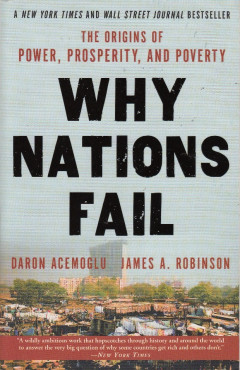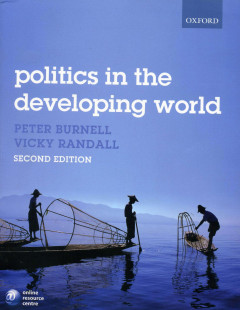Ditapis dengan
Ditemukan 2 dari pencarian Anda melalui kata kunci: subject="Negara berkembang - P...

Why Nations Fail : The Origins of Power, Prosperity, and Poverty
Why are some nations rich and others poor, divided by wealth and poverty, health and sickness, food and famine? Is it culture, the weather, or geography that determines prosperity or poverty? As Why Nations Fail shows, none of these factors is either definitive or destiny. Drawing on fifteen years of original research, Daron Acemoglu and James Robinson conclusively show that it is our man-made …
- Edisi
- -
- ISBN/ISSN
- 978-0-307-71922-5
- Deskripsi Fisik
- 529 hlm. ; 21 cm.
- Judul Seri
- -
- No. Panggil
- -

Politics in the developing world
This text book brings together key scholars to introduce students to politics in the developing world. Theoriticall and conceptual chapters are folowed by a carefull selection of case studies
- Edisi
- ed. 2
- ISBN/ISSN
- 978-0-19-929608-8
- Deskripsi Fisik
- 552 hal. : il. ; 28 cm.
- Judul Seri
- -
- No. Panggil
- -
 Karya Umum
Karya Umum  Filsafat
Filsafat  Agama
Agama  Ilmu-ilmu Sosial
Ilmu-ilmu Sosial  Bahasa
Bahasa  Ilmu-ilmu Murni
Ilmu-ilmu Murni  Ilmu-ilmu Terapan
Ilmu-ilmu Terapan  Kesenian, Hiburan, dan Olahraga
Kesenian, Hiburan, dan Olahraga  Kesusastraan
Kesusastraan  Geografi dan Sejarah
Geografi dan Sejarah